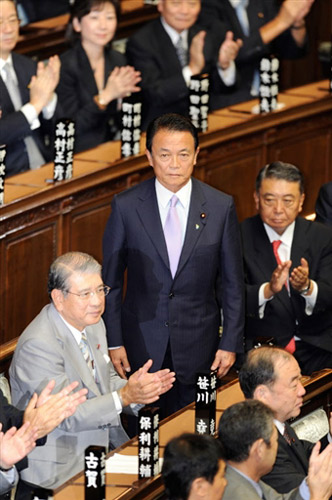Taro Aso was elected Japanese Prime Minister on September 24, and he announced his cabinet members on the same day.
 |
|
At 13:30 on September 24, Taro Aso, the newly elected president of Japan's ruling Liberal Democratic Party, was appointed the 92nd Japanese Prime Minister. |
60 percent of the polled netizens have a pessimistic view of Sino-Japanese relations after Taro Aso was elected, 20 percent say that bilateral ties will not be affected, and fewer than 10 percent believe that current friendly ties will be maintained, according to an online survey conducted by chinanews.com, covering 1,600 respondents polled up to 12:00 p.m. on September 26.
87 percent expect Taro Aso to stay away from the Yasukuni Shrine, seen by many in Asia as a symbol of Japan's past militarism, and almost the same proportion hope the newly elected prime minister will adhere to the One-China Principle.
Respondents believe that Taro Aso's visit to the Yasukuni Shrine would damage improving relations between China and Japan, said Liu Jiangyong, a professor with Tsinghua University's Institute of International Studies.
The results showed that Chinese netizens pay increasing attention to the development of Sino-Japanese ties, said Liu.
Bilateral relations improved dramatically during the period of Yasuo Fukuda's administration. His friendly policies towards China won widespread approval from the Chinese people.
But some members of Aso's cabinet take a hard-line approach towards China, with the result that 60 percent of respondents view future bilateral ties with pessimism, said Liu.
It is hoped that a cordial relationship with Beijing can continue at least up to the approaching general election in November, as Aso's top priority will be to lead his party to victory in the campaign rather than change Japan's foreign policy towards China.
But if Aso wins the general election and announces the same cabinet, the relationship between Toyko and Beijing may encounter some turbulence as a result of the hard-line members. If Aso fails, his cabinet will be recorded as the shortest-lived in the history of Japanese politics. And Aso might still stir up the issue of bilateral ties if he thinks this might add to his support during the election campaign, said Liu.
(China.org.cn by Yang Xi, September 28, 2008)